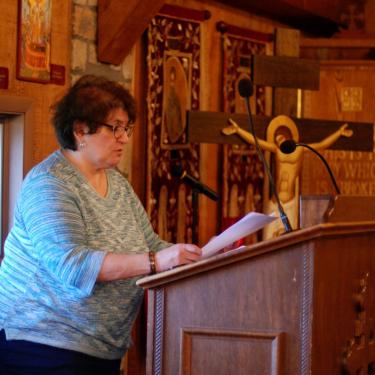
Continuing our series about lessons we've learned in our first months as Axia Women. I'm hoping this one can be used to inform our clergy and hierarchs.
Don’t walk programs and roles back that have been established. This lesson relates to a trend that I keep hearing about, from women throughout the country. There are parishes where women and girls have become accustomed participating in services, maybe by reading the epistle from the ambon, giving sermons, taking part in processionals, and/or serving as “handmaidens” of some kind during the liturgy. Then a new bishop or priest replaces the old, and suddenly those women and girls are no longer allowed to do those things. Or maybe in places where the priest had formerly allowed the readers to address the epistle to “Brothers and Sisters,” they suddenly have to return to using the exclusionary term “Brethren.” I promise you, it’s hard enough—as a woman or a girl—to be part of a parish that has never allowed you to participate in the services or has consistently used language that excludes you.
But it is far, far worse when you’ve had the more welcoming experience and the bishop or priest suddenly makes a regressive change. Because the effect of that is to make you feel: what? Unworthy? Tainted? Some sort of second-class human being? What I’m hearing is that the women notice and feel these things. The girls, too. They notice it and it acts on their minds and hearts, and not in a good way.
The word needs to go out that, in the Orthodox universe, in the United States, anyway, there are parishes where it is normal for women to sing in the choir or chant. It is even normal in places for them to lead the choir or chanting. There are many parishes where they can publicly read the epistle or read the Hours during a service. They can hold the communion cloth. In addition to teaching church school to children, there are places where it is normal for women to be in charge of adult Bible study or other education. There are places where they have been given the blessing to go into the altar, if there is a need for them to do so. In some places, women have also been given the blessing to preach on a regular basis. There are places where it is normal for girls to have a liturgical function in the main body of the church. There are even places where girls have been given the blessing to serve a liturgical role inside the altar or behind the icon screen.


There aren't many good reasons to withdraw your blessing to do these things. Withdrawing that blessing is a huge deal and it shouldn't be triggered as a response to someone who just doesn't like women's voices, or a fellow parishioner grumbled about it, or a visitor was startled . It would be immensely helpful--pastoral even--to our women and girls if our theologians and bishops would agree to a welcoming, open consensus that would allow the more loving and pastoral practices to become standard across the board, rather than subject to whim.
Addendum: Ladies and gentlemen, if your parish has had this happen, you should strongly consider making an appointment with your priest and with your bishop to bear witness, in person, to the negative effect it is having on you, your family (if you have one) and your community. They may have been acting under the impression that the change would matter little to anyone. They need better information. Let go of what you expect the outcome to be. Speaking up is valuable in itself.
Patricia Fann Bouteneff is president of Axia Women.


